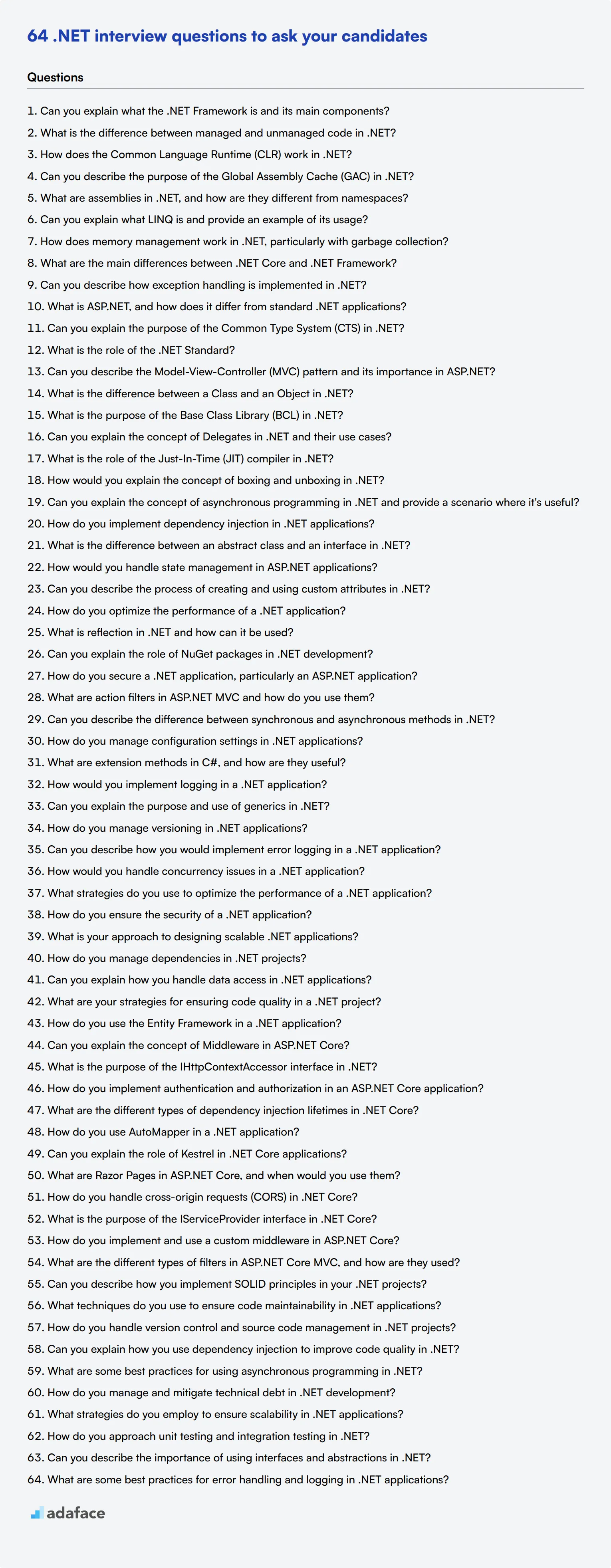Hiring the right .NET developer can make or break your project's success. Conducting effective interviews is key to identifying candidates with the necessary skills and experience to excel in your team.
This blog post provides a comprehensive list of .NET interview questions, categorized by experience level and topic. From basic concepts to advanced framework features and best practices, we've got you covered with 64 carefully curated questions and answers.
Use these questions to thoroughly evaluate candidates' .NET expertise and make informed hiring decisions. For an even more thorough assessment, consider using a .NET online test to objectively evaluate candidates' skills before the interview stage.
Table of contents
10 .NET interview questions to initiate the interview
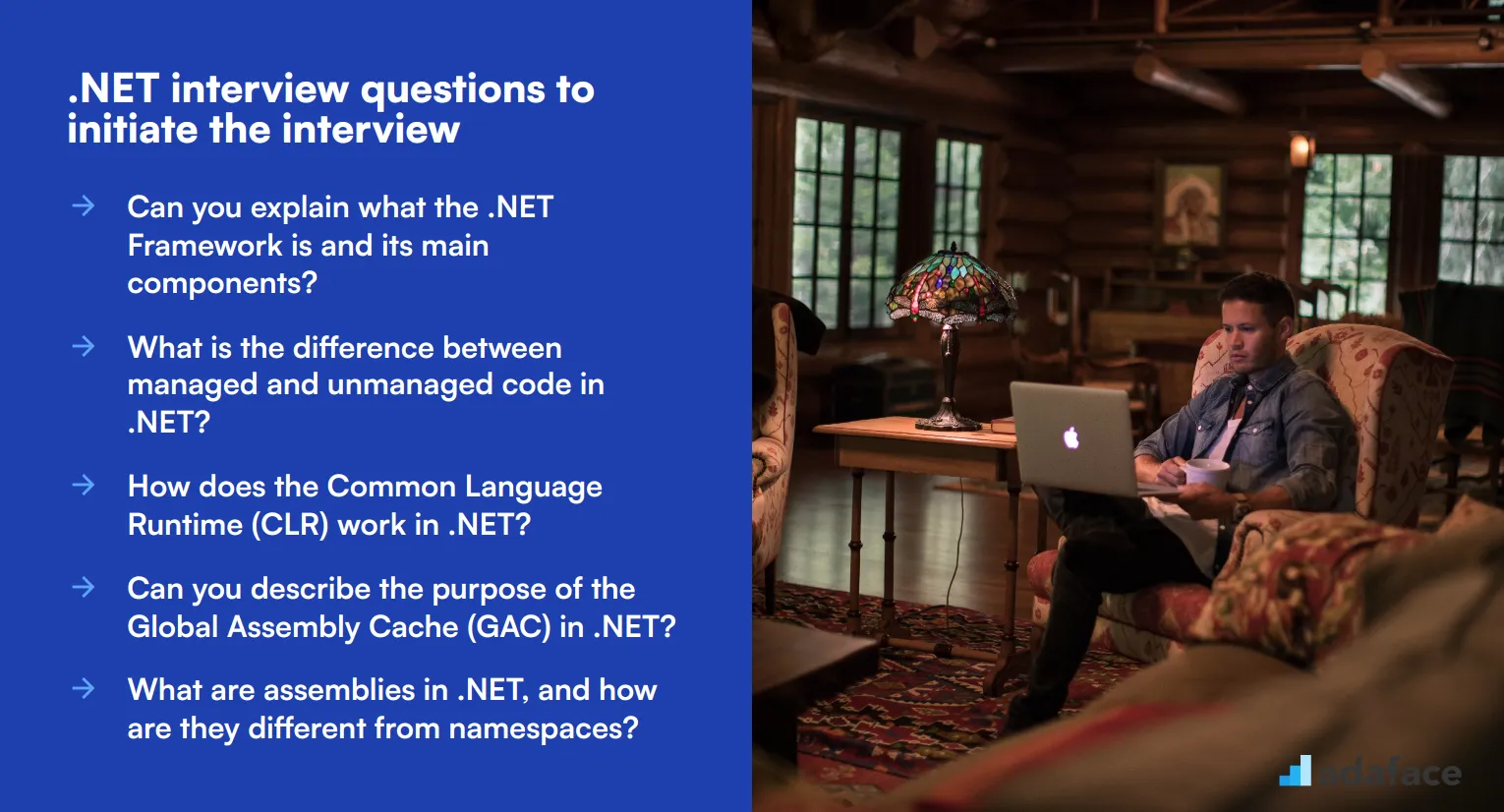
To effectively evaluate a candidate's expertise in .NET, consider using these questions during the initial stages of the interview. They will help you gauge the applicant's understanding of essential .NET concepts and their practical skills. For a deeper dive into the required skills, check out this comprehensive guide.
- Can you explain what the .NET Framework is and its main components?
- What is the difference between managed and unmanaged code in .NET?
- How does the Common Language Runtime (CLR) work in .NET?
- Can you describe the purpose of the Global Assembly Cache (GAC) in .NET?
- What are assemblies in .NET, and how are they different from namespaces?
- Can you explain what LINQ is and provide an example of its usage?
- How does memory management work in .NET, particularly with garbage collection?
- What are the main differences between .NET Core and .NET Framework?
- Can you describe how exception handling is implemented in .NET?
- What is ASP.NET, and how does it differ from standard .NET applications?
8 .NET interview questions and answers to evaluate junior developers
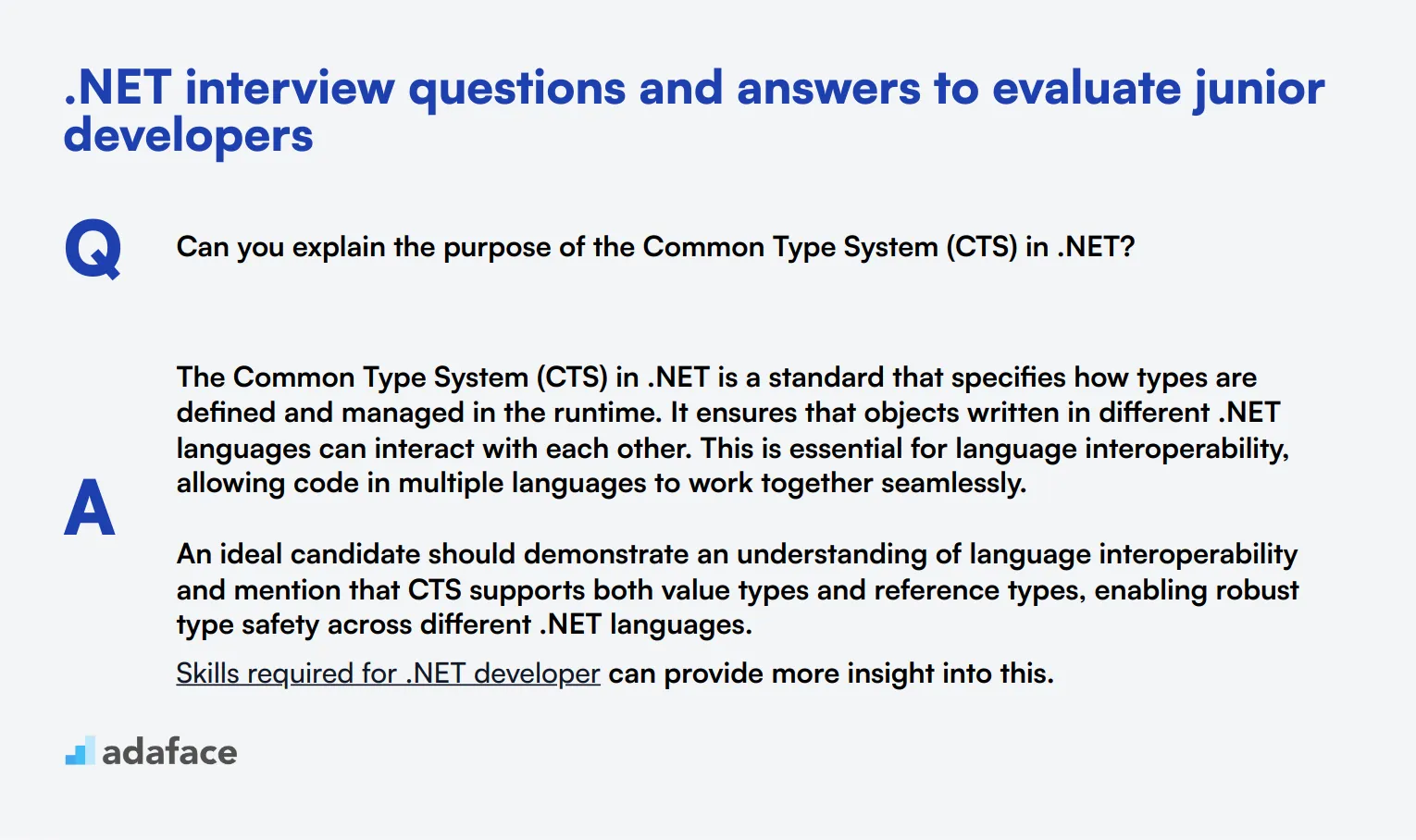
To effectively assess whether a junior developer has the foundational knowledge and problem-solving skills necessary for your .NET projects, use these targeted interview questions. They will help you explore their understanding of key concepts and their ability to apply this knowledge in practical scenarios.
1. Can you explain the purpose of the Common Type System (CTS) in .NET?
The Common Type System (CTS) in .NET is a standard that specifies how types are defined and managed in the runtime. It ensures that objects written in different .NET languages can interact with each other. This is essential for language interoperability, allowing code in multiple languages to work together seamlessly.
An ideal candidate should demonstrate an understanding of language interoperability and mention that CTS supports both value types and reference types, enabling robust type safety across different .NET languages.
Skills required for .NET developer can provide more insight into this.
2. What is the role of the .NET Standard?
The .NET Standard is a formal specification of .NET APIs that are intended to be available on all .NET implementations. It acts as a base set of APIs that all .NET platforms must implement, ensuring consistent functionality across different environments like .NET Core, .NET Framework, and Xamarin.
Strong candidates will articulate that the .NET Standard simplifies code sharing and reuse across different .NET platforms, fostering a more unified ecosystem.
3. Can you describe the Model-View-Controller (MVC) pattern and its importance in ASP.NET?
The Model-View-Controller (MVC) pattern is a design pattern used to separate the application's concerns. The Model represents the data and business logic, the View displays the data, and the Controller handles input and updates the Model. This separation facilitates modular development and testing.
A candidate's response should highlight how MVC helps in building scalable and maintainable web applications, promoting a clear separation of concerns, and enabling parallel development.
4. What is the difference between a Class and an Object in .NET?
A Class in .NET is a blueprint or template for creating objects. It defines properties, methods, and events. An Object, on the other hand, is an instance of a class. It represents a specific realization of the class with actual values and states.
Candidates should be able to explain that while a class defines the structure and behavior, an object is a working entity of that class. Look for a clear understanding of how classes and objects interact in .NET applications.
5. What is the purpose of the Base Class Library (BCL) in .NET?
The Base Class Library (BCL) in .NET provides a fundamental set of classes that serve as the building blocks for any .NET application. These classes include basic data types, collections, file I/O, and more, providing a consistent programming model across different .NET implementations.
Ideal candidates will explain that the BCL simplifies development by providing a rich set of pre-built functionalities, reducing the need to write common code from scratch and promoting code reuse.
6. Can you explain the concept of Delegates in .NET and their use cases?
Delegates in .NET are type-safe pointers to methods. They are used to encapsulate a method signature and can point to any method that matches this signature. Delegates are commonly used for implementing events and callback methods.
Candidates should mention practical use cases such as event handling in GUI applications or implementing callback methods, demonstrating their understanding of how delegates enhance flexibility and decoupling in code.
7. What is the role of the Just-In-Time (JIT) compiler in .NET?
The Just-In-Time (JIT) compiler in .NET converts Intermediate Language (IL) code into native machine code just before execution. This compilation happens at runtime, allowing the .NET runtime to optimize the machine code for the specific hardware it is running on.
A strong answer will highlight that JIT compilation balances the benefits of precompiled code with the flexibility of runtime optimization, ensuring efficient execution of .NET applications.
8. How would you explain the concept of boxing and unboxing in .NET?
Boxing in .NET is the process of converting a value type (such as int, float) to a reference type (object). Unboxing is the reverse process, where the reference type is converted back to a value type. These operations are useful when value types need to be treated as objects.
Ideal candidates will discuss the performance implications of boxing and unboxing, as these operations can be costly in terms of memory and processing time. They should be cautious about overusing them to avoid performance bottlenecks.
15 intermediate .NET interview questions and answers to ask mid-tier developers.
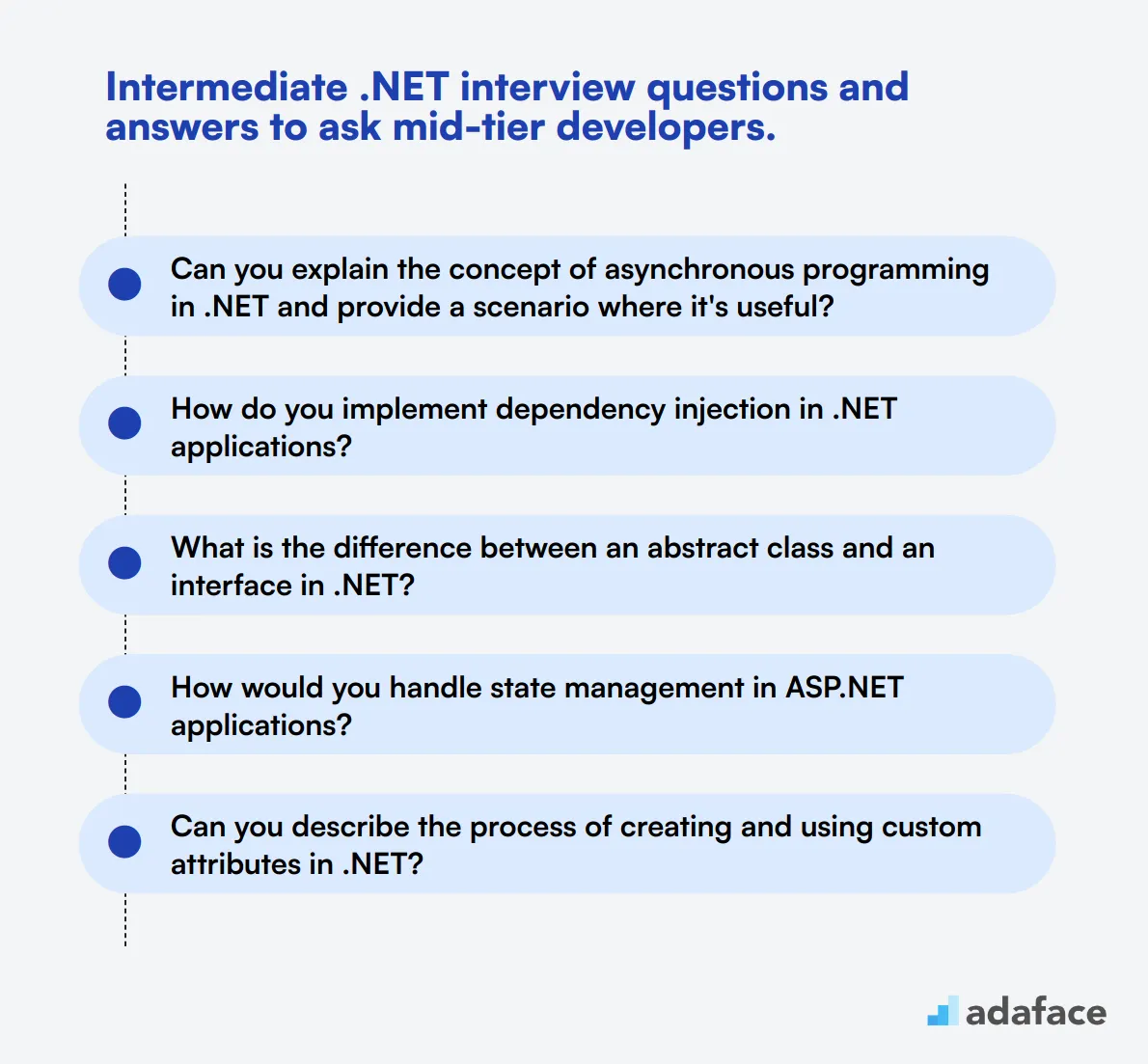
To ensure your mid-tier .NET developer candidates possess the right technical skills and problem-solving abilities, use these intermediate .NET interview questions. These questions will help you gauge their deeper understanding of core concepts and practical application of .NET technologies.
- Can you explain the concept of asynchronous programming in .NET and provide a scenario where it's useful?
- How do you implement dependency injection in .NET applications?
- What is the difference between an abstract class and an interface in .NET?
- How would you handle state management in ASP.NET applications?
- Can you describe the process of creating and using custom attributes in .NET?
- How do you optimize the performance of a .NET application?
- What is reflection in .NET and how can it be used?
- Can you explain the role of NuGet packages in .NET development?
- How do you secure a .NET application, particularly an ASP.NET application?
- What are action filters in ASP.NET MVC and how do you use them?
- Can you describe the difference between synchronous and asynchronous methods in .NET?
- How do you manage configuration settings in .NET applications?
- What are extension methods in C#, and how are they useful?
- How would you implement logging in a .NET application?
- Can you explain the purpose and use of generics in .NET?
9 advanced .NET interview questions and answers to evaluate senior developers
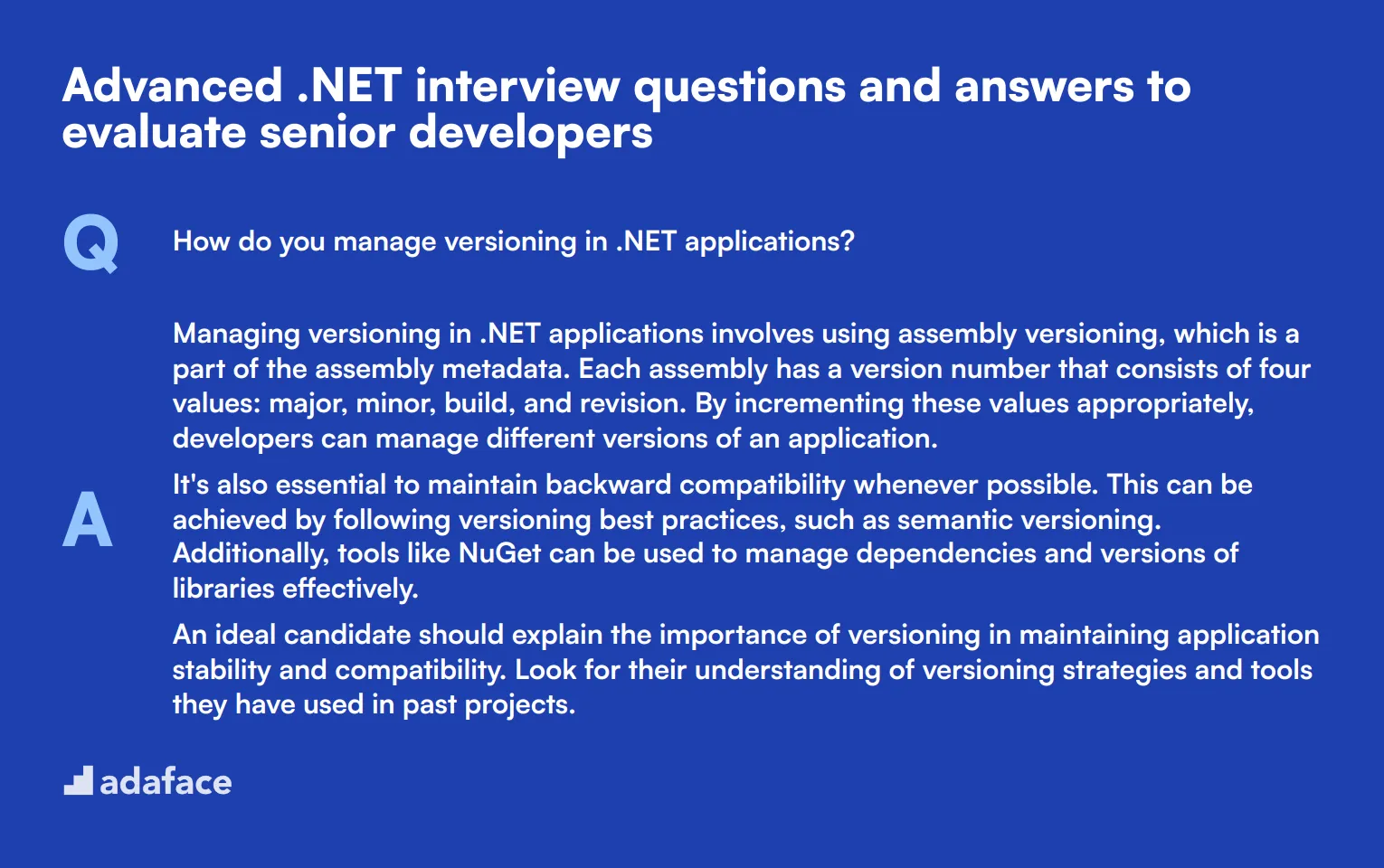
To determine whether your applicants have the depth of knowledge and experience necessary for senior .NET development roles, ask them some of these advanced .NET interview questions. This list is designed to help you assess their problem-solving skills, understanding of complex concepts, and ability to work effectively in high-level projects.
1. How do you manage versioning in .NET applications?
Managing versioning in .NET applications involves using assembly versioning, which is a part of the assembly metadata. Each assembly has a version number that consists of four values: major, minor, build, and revision. By incrementing these values appropriately, developers can manage different versions of an application.
It's also essential to maintain backward compatibility whenever possible. This can be achieved by following versioning best practices, such as semantic versioning. Additionally, tools like NuGet can be used to manage dependencies and versions of libraries effectively.
An ideal candidate should explain the importance of versioning in maintaining application stability and compatibility. Look for their understanding of versioning strategies and tools they have used in past projects.
2. Can you describe how you would implement error logging in a .NET application?
Implementing error logging in a .NET application typically involves using logging libraries like log4net, NLog, or the built-in Microsoft.Extensions.Logging. These libraries provide configurable logging mechanisms that can log errors to various destinations like files, databases, or external services.
Developers should configure the logging library in the application startup code and use different logging levels (e.g., Debug, Info, Warn, Error, Fatal) to capture and categorize logs appropriately. Structured logging can also be implemented to provide more context in the logs, making it easier to diagnose issues.
Candidates should demonstrate their familiarity with logging frameworks and their ability to configure and use them effectively. Look for examples of how they've solved real-world logging challenges in their previous projects.
3. How would you handle concurrency issues in a .NET application?
Concurrency issues in a .NET application can be handled using various synchronization techniques, such as locks, mutexes, and semaphores. These techniques help prevent race conditions by ensuring that only one thread accesses a shared resource at a time.
Another approach is to use concurrent collections provided by the .NET framework, such as ConcurrentDictionary or ConcurrentQueue. These collections are designed to handle concurrent access efficiently without requiring explicit synchronization.
Strong candidates should discuss their experience with different synchronization mechanisms and their trade-offs. Look for their ability to choose the right approach based on the specific requirements and constraints of a project.
4. What strategies do you use to optimize the performance of a .NET application?
Optimizing the performance of a .NET application involves several strategies, including code optimization, efficient memory management, and minimizing resource contention. Profiling tools like Visual Studio Profiler or dotTrace can help identify performance bottlenecks.
Developers should also focus on optimizing database access by using efficient queries and caching frequently accessed data. Asynchronous programming can improve responsiveness by offloading long-running tasks. Additionally, minimizing the use of reflection and unnecessary object creation can lead to significant performance gains.
An ideal candidate should highlight their experience with performance tuning and the tools they have used. Look for specific examples of how they've identified and resolved performance issues in their past projects. Learn more about optimizing .NET applications.
5. How do you ensure the security of a .NET application?
Ensuring the security of a .NET application involves implementing best practices like input validation, authentication and authorization, and secure communication. Input validation helps prevent injection attacks by ensuring that user inputs are sanitized and validated.
Authentication and authorization can be managed using frameworks like ASP.NET Identity or OAuth. Secure communication can be ensured by using HTTPS and data encryption techniques. Regular security audits and the use of static code analysis tools can also help identify and fix vulnerabilities.
Candidates should demonstrate their knowledge of security best practices and their ability to implement them in real-world applications. Look for their experience with security frameworks and tools, as well as their approach to staying updated with the latest security trends.
6. What is your approach to designing scalable .NET applications?
Designing scalable .NET applications involves adopting a modular architecture, such as microservices or service-oriented architecture (SOA). This approach allows different parts of the application to scale independently based on demand.
Using caching mechanisms, load balancing, and asynchronous processing can also enhance scalability. Cloud services like Azure can be leveraged to provide scalable infrastructure and services. Additionally, following best practices for database design and optimizing queries can help manage large volumes of data effectively.
Candidates should explain their experience with scalable architectures and their ability to design and implement solutions that can handle growth. Look for their understanding of scalability challenges and the strategies they've used to address them.
7. How do you manage dependencies in .NET projects?
Managing dependencies in .NET projects typically involves using package managers like NuGet. NuGet allows developers to easily add, update, and remove libraries and tools that their projects depend on. It also helps manage versioning and compatibility of these dependencies.
Developers should also use dependency injection to manage dependencies in a more structured and maintainable way. This involves injecting dependencies through constructors or properties, which makes the code more modular and testable.
An ideal candidate should demonstrate their experience with dependency management and their ability to use tools like NuGet effectively. Look for their understanding of dependency injection principles and their approach to managing dependencies in large projects.
8. Can you explain how you handle data access in .NET applications?
Handling data access in .NET applications often involves using Object-Relational Mapping (ORM) frameworks like Entity Framework or Dapper. These frameworks simplify data access by allowing developers to work with database records as objects.
Developers should also implement best practices like using parameterized queries to prevent SQL injection attacks and optimizing queries for performance. Additionally, using asynchronous data access methods can improve application responsiveness.
Candidates should demonstrate their experience with data access frameworks and their ability to write efficient and secure data access code. Look for their understanding of ORM concepts and their approach to handling complex data access scenarios.
9. What are your strategies for ensuring code quality in a .NET project?
Ensuring code quality in a .NET project involves adopting practices like code reviews, unit testing, and continuous integration. Code reviews help catch issues early and ensure that the code adheres to best practices and coding standards.
Unit testing involves writing tests for individual components to ensure they work as expected. Tools like MSTest, NUnit, or xUnit can be used for this purpose. Continuous integration involves automating the build and testing process to catch issues as soon as code changes are made.
An ideal candidate should discuss their experience with these practices and tools. Look for their approach to maintaining code quality and their ability to implement effective quality assurance processes in a team environment.
12 .NET interview questions about framework features
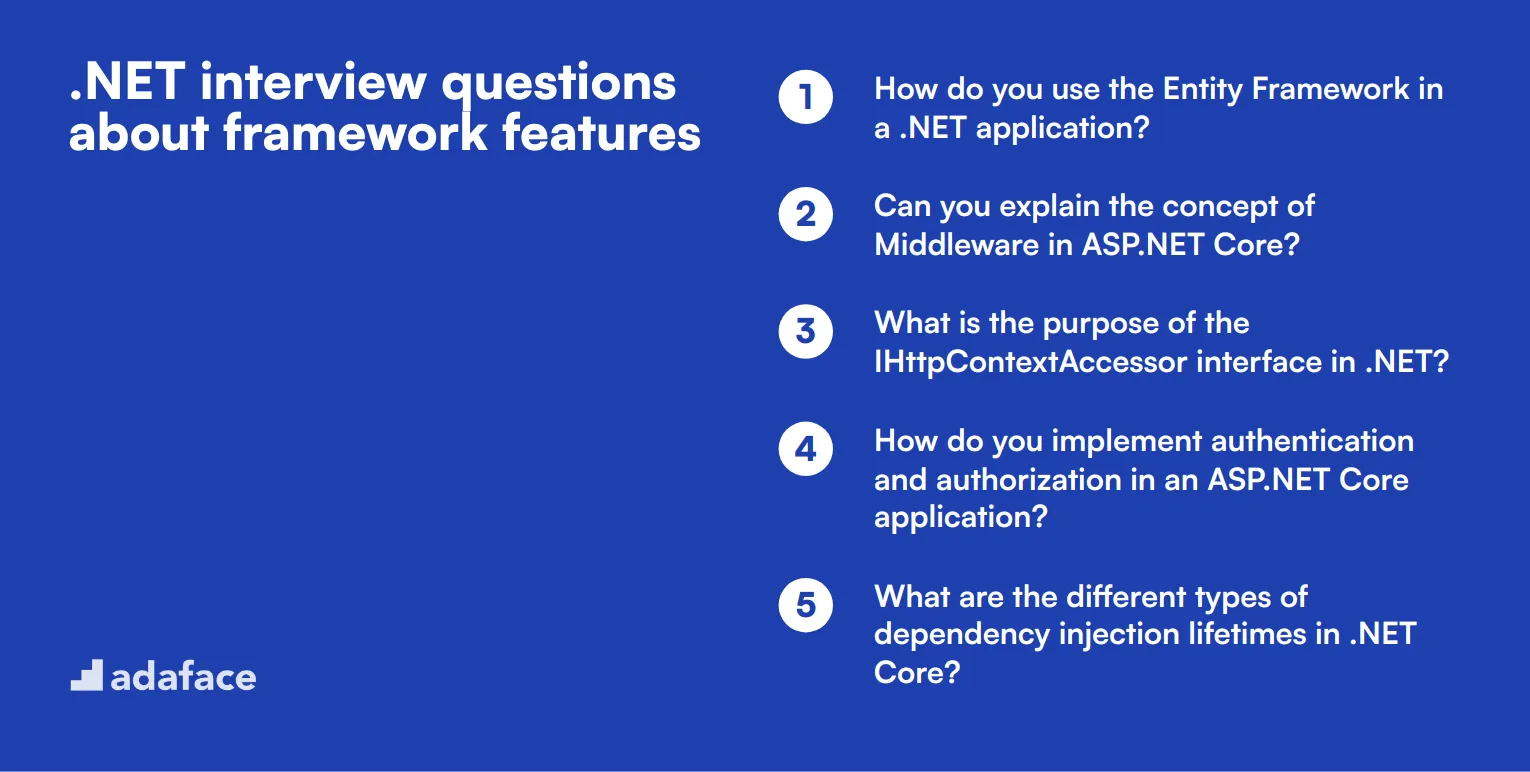
To gauge whether your applicants possess the right skills for .NET development, consider incorporating some of these key interview questions about the framework's features. These questions can help you assess their technical understanding and practical knowledge, ensuring you select the best candidate for your team. For more insights, check out the skills required for a .NET developer.
- How do you use the Entity Framework in a .NET application?
- Can you explain the concept of Middleware in ASP.NET Core?
- What is the purpose of the IHttpContextAccessor interface in .NET?
- How do you implement authentication and authorization in an ASP.NET Core application?
- What are the different types of dependency injection lifetimes in .NET Core?
- How do you use AutoMapper in a .NET application?
- Can you explain the role of Kestrel in .NET Core applications?
- What are Razor Pages in ASP.NET Core, and when would you use them?
- How do you handle cross-origin requests (CORS) in .NET Core?
- What is the purpose of the IServiceProvider interface in .NET Core?
- How do you implement and use a custom middleware in ASP.NET Core?
- What are the different types of filters in ASP.NET Core MVC, and how are they used?
10 .NET interview questions about best practices
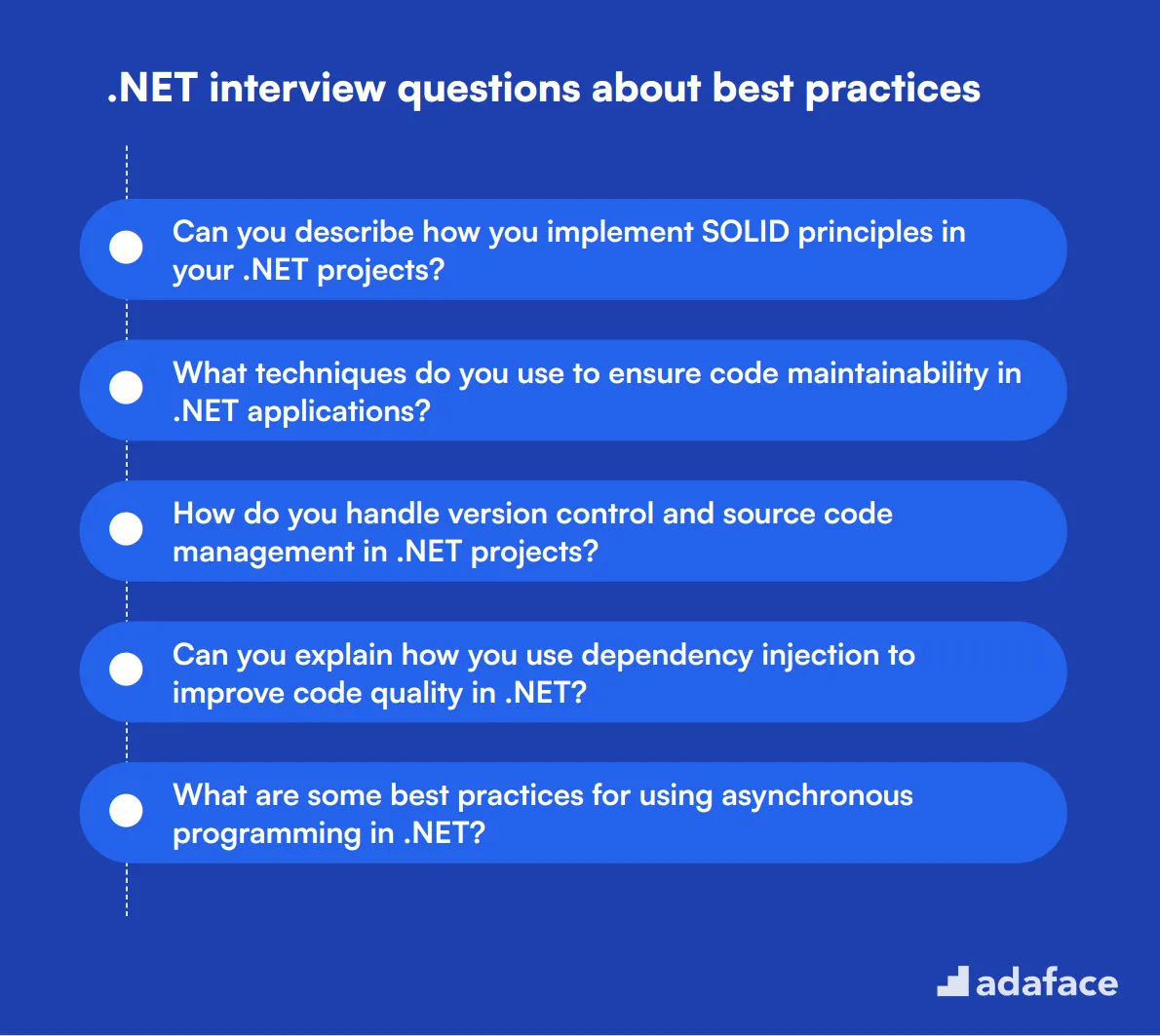
To ensure your candidates possess the skills required for .NET development, use these interview questions focused on best practices. These questions will help you evaluate their understanding of key principles and ability to apply them effectively.
- Can you describe how you implement SOLID principles in your .NET projects?
- What techniques do you use to ensure code maintainability in .NET applications?
- How do you handle version control and source code management in .NET projects?
- Can you explain how you use dependency injection to improve code quality in .NET?
- What are some best practices for using asynchronous programming in .NET?
- How do you manage and mitigate technical debt in .NET development?
- What strategies do you employ to ensure scalability in .NET applications?
- How do you approach unit testing and integration testing in .NET?
- Can you describe the importance of using interfaces and abstractions in .NET?
- What are some best practices for error handling and logging in .NET applications?
Which .NET skills should you evaluate during the interview phase?
While a single interview may not reveal everything about a candidate's potential, focusing on key .NET skills can significantly streamline the assessment process. These skills are foundational to determining how well the candidate will perform in real-world .NET development scenarios.
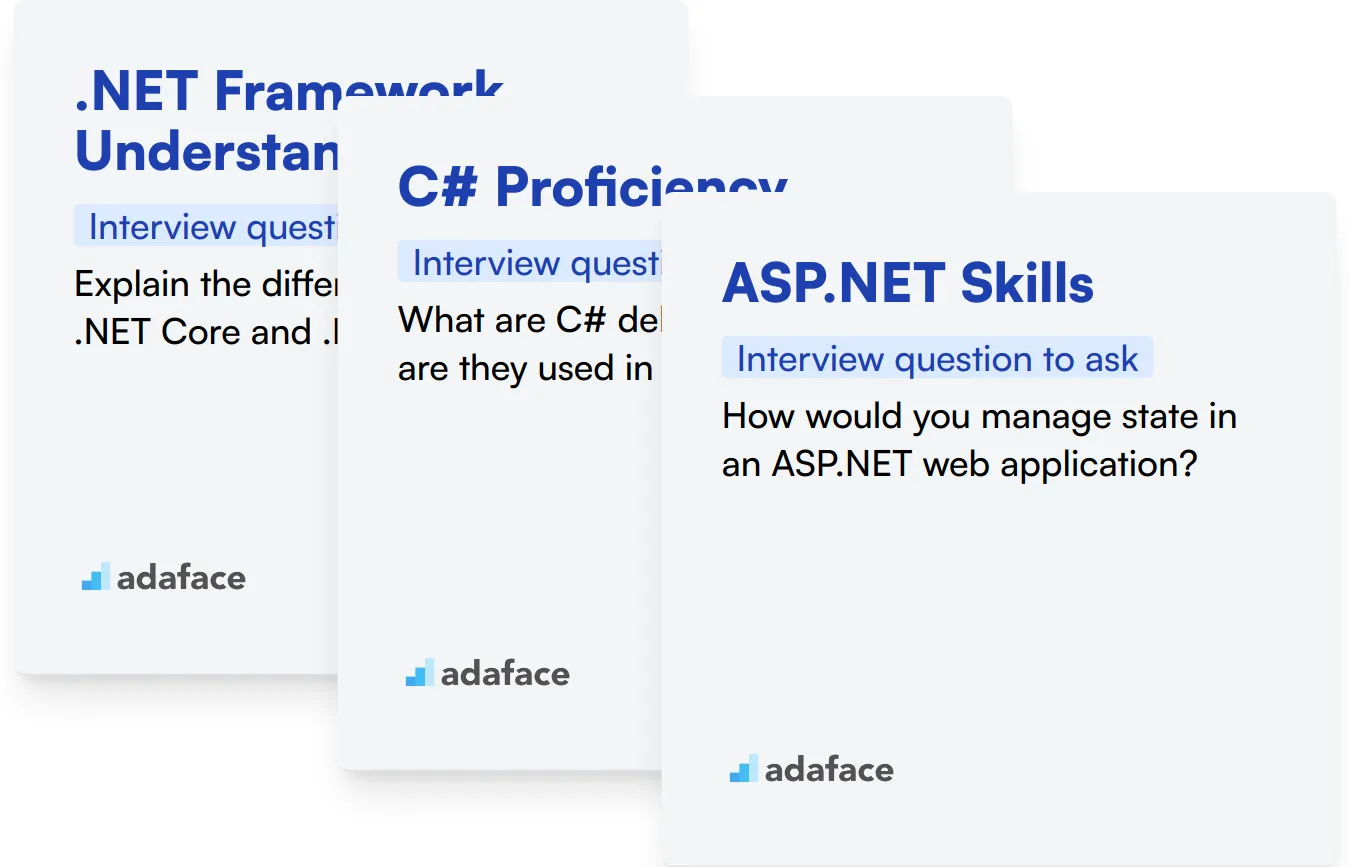
.NET Framework Understanding
A deep understanding of the .NET Framework is essential for any developer working in this environment. It ensures the candidate can effectively leverage the extensive library to create efficient applications.
Consider using a structured assessment to evaluate this skill, like our .NET assessment test, which is designed to gauge framework knowledge through relevant MCQs.
To delve deeper, pose interview questions that test their practical knowledge and application of the .NET Framework.
Explain the difference between .NET Core and .NET Framework.
Look for clarity in their explanation and understanding of both platforms' use cases. This distinguishes candidates who keep pace with .NET evolution.
C# Proficiency
C# is the primary language for .NET development, and proficiency in C# is indicative of a candidate's ability to handle typical .NET tasks.
To screen candidates on this skill, you might use a targeted MCQ test like our C# test to assess their language-specific knowledge.
Additionally, asking specific C# questions during the interview can provide insight into their coding capabilities.
What are C# delegates and how are they used in the framework?
Look for comprehensive descriptions of delegates along with examples of use cases in .NET, indicating practical understanding and application knowledge.
ASP.NET Skills
ASP.NET expertise is important for building robust, scalable, and interactive web applications using the .NET framework.
Assess this skill with a dedicated test like our ASP.NET MVC test that covers scenarios specific to ASP.NET development.
In the interview, include questions that challenge the candidate to demonstrate their ASP.NET skills.
How would you manage state in an ASP.NET web application?
Effective answers should include various state management techniques such as ViewState, SessionState, Cache, and Cookies, reflecting their ability to handle web application complexities.
Strategizing .NET Interview Questions: A Guide for Interviewers
As you prepare to put the .NET interview questions to use, here are some expert tips to ensure you're effectively assessing candidates.
1. Implement Skills Tests Early in the Hiring Process
Integrating skills assessments before the interview stages can streamline the process of identifying qualified candidates. By requiring candidates to undergo tests such as the .NET Online Test or specific language tests like C#, you filter out those who may lack necessary technical skills.
This approach not only saves valuable interview time but also ensures that you are interacting with candidates who have already demonstrated a certain level of competency. Example benefits include higher interview relevance and focused discussions on candidate-specific strengths and areas for development.
Transitioning into in-depth interviews following successful test outcomes allows for a more targeted and efficient evaluation process.
2. Curate Your Interview Questions Thoughtfully
Time during interviews is limited, making it essential to select questions that effectively evaluate the most important aspects or sub-skills of the role. By focusing on comprehensive yet concise questioning, you maximize the potential to gauge critical skills.
Consider incorporating questions that assess related technical skills or soft skills vital for the position. For instance, exploring communication or problem-solving aptitudes can be as informative as direct technical inquiries.
Linking questions to specific job needs ensures that the interview covers all necessary aspects without veering off into less relevant territories.
3. Utilize Follow-Up Questions for Deeper Insight
Relying solely on standard interview questions might not reveal a candidate’s full potential or true understanding. Follow-up questions are key to digging deeper and verifying the depth of a candidate's knowledge and skills.
For example, if a candidate describes an experience with .NET framework, a good follow-up might be, 'Can you explain a challenge you faced while implementing .NET Core and how you overcame it?' This prompts the candidate to provide more detailed insights and demonstrate problem-solving capabilities.
Find and evaluate .NET developers using the right interview questions and skills tests
If you are looking to hire someone with .NET skills, it is essential to ensure they possess those skills accurately. The most efficient way to do this is by utilizing skills tests, such as the C# .NET Online Test to gauge their proficiency.
After administering these tests, you can effectively shortlist the best applicants and invite them for interviews. To get started, consider signing up on our assessment platform to access a variety of relevant tests and streamline your hiring process.
.NET Online Test
Download .NET interview questions template in multiple formats
.NET Interview Questions FAQs
Common questions for junior developers include basics of C#, ASP.NET, and OOP concepts.
Ask intermediate questions about multi-threading, LINQ, and MVC architecture to gauge their expertise.
Questions on advanced topics like microservices, design patterns, and performance tuning are ideal.
These questions help determine the candidate's understanding of the framework's capabilities and limitations.
It helps to evaluate if the candidate follows industry standards and writes maintainable code.
Look for depth of knowledge, problem-solving abilities, and practical experience.

40 min skill tests.
No trick questions.
Accurate shortlisting.
We make it easy for you to find the best candidates in your pipeline with a 40 min skills test.
Try for freeRelated posts
Free resources




